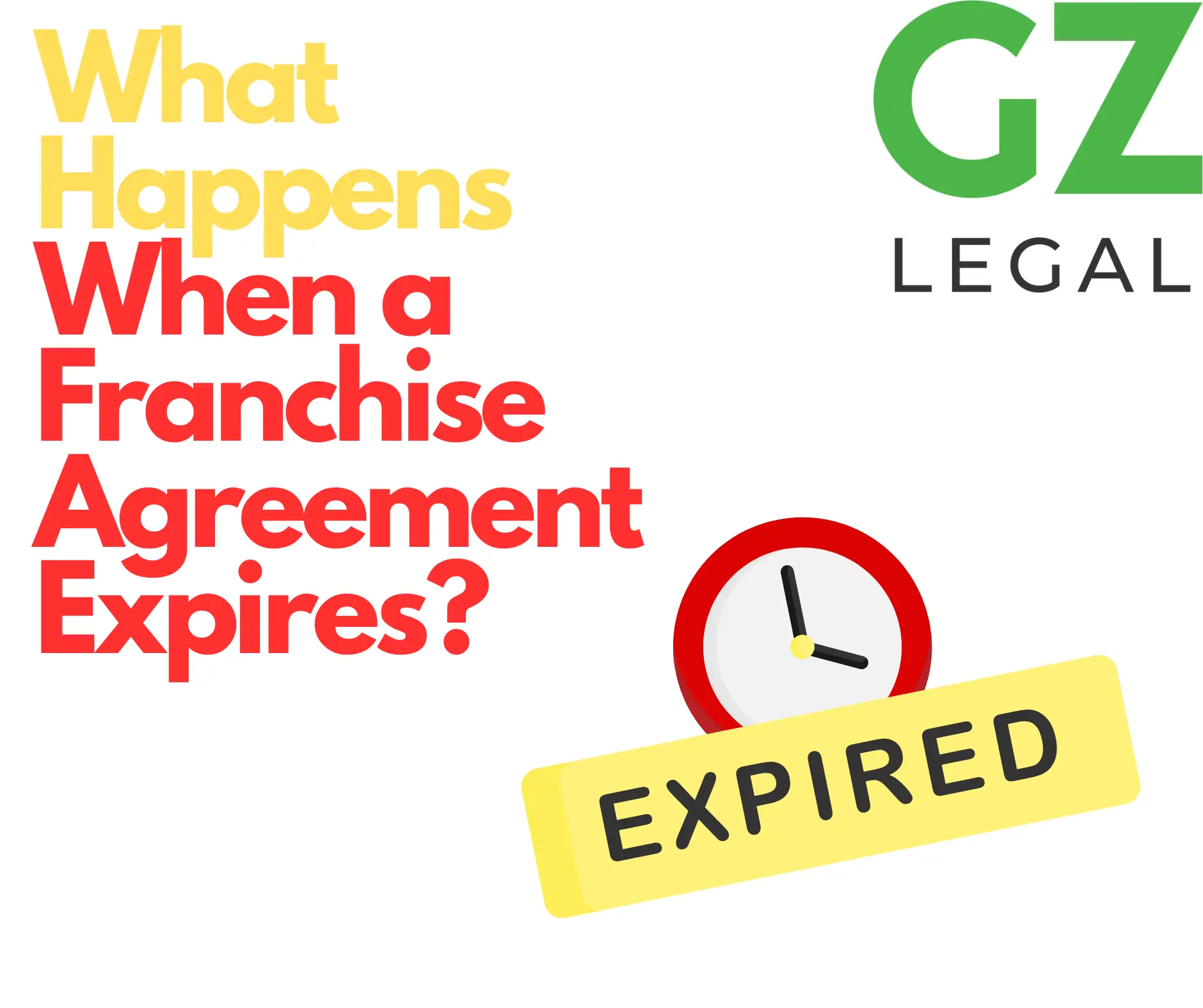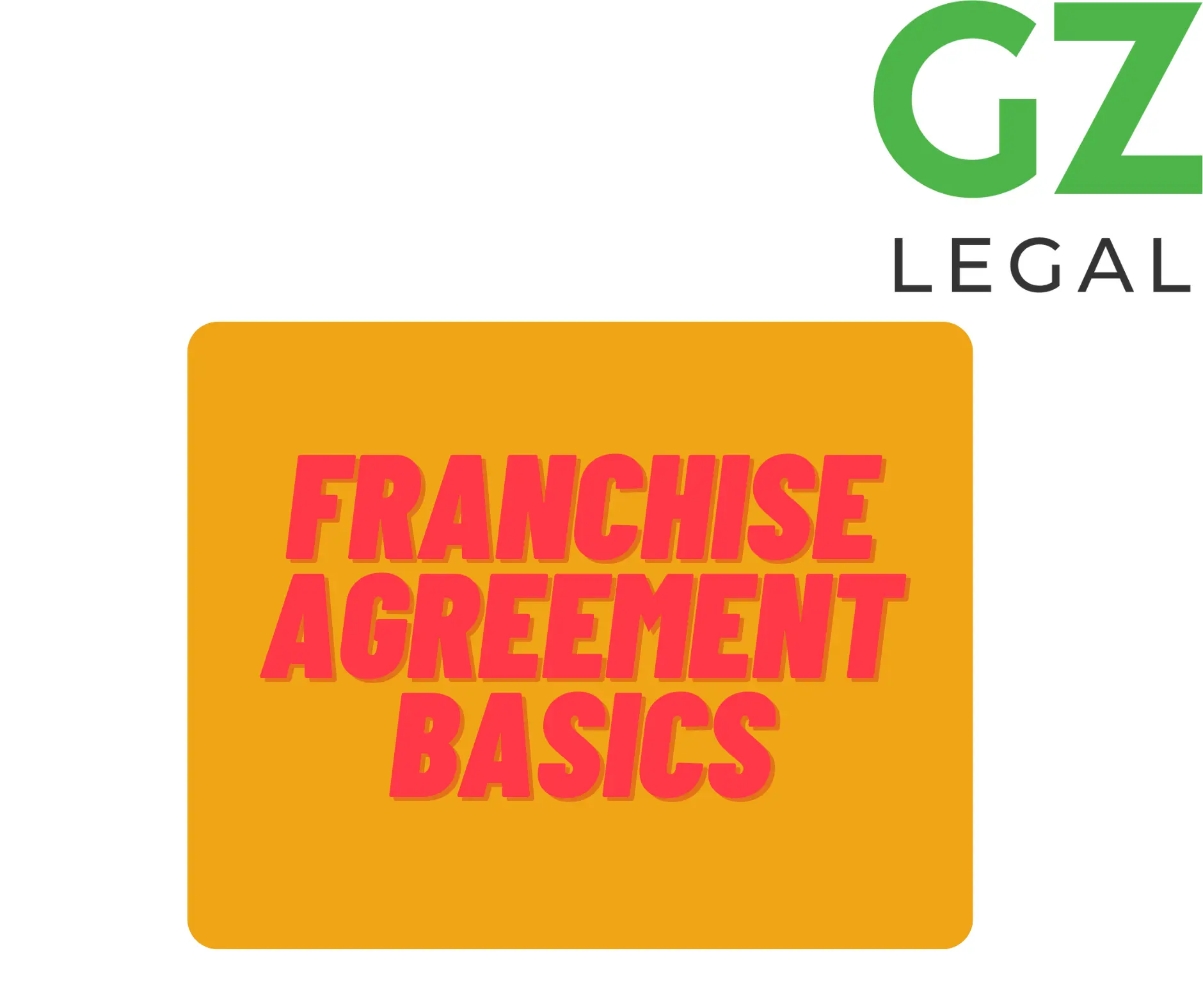Malcolm ZoppiSun Oct 15 2023
What Happens When a Franchise Agreement Expires? Key Insights and Consequences
Franchise agreements have a set term and will eventually expire, requiring action from both parties.
What Happens When a Franchise Agreement Expires? Key Insights and Consequences

When entering a franchise agreement, both the franchisor and the franchisee are usually excited about the new partnership and the potential for success. However, it is important to understand that most franchise agreements have a predetermined expiration date. Knowing what happens when a franchise agreement expires is crucial for both parties to make informed decisions about the future of their business relationship.
A franchise agreement is a legally binding contract that spells out the terms and conditions of the franchisor-franchisee relationship, including the rights and obligations of both parties. As franchise agreements typically last for a set term, often ranging from five to twenty years, it is essential for franchisees to be prepared for the end of the franchise agreement term and the options available to them, which may include renewal of the contract, termination, or transitioning to a different business model. Understanding the potential outcomes and legal implications of the agreement’s expiration will help franchisees make informed decisions about their future in the business.
Key Takeaways
- Franchise agreements have a set term and will eventually expire, requiring action from both parties.
- Renewal, termination, or transition to a new business model are potential outcomes when a franchise agreement ends.
- Knowledge of legal implications and available options will help franchisees make informed decisions about their future in the business.
Franchise Agreement Basics

A franchise agreement is a legal document that establishes the relationship between a franchisor and franchisee, allowing the latter to operate a business using the former’s systems, intellectual property, and brand. In this section, we’ll discuss the basics of a franchise agreement and what really happens at the end when it expires.
Firstly, it is important to understand the components of a franchise agreement. This typically includes details such as the terms and conditions, rights and obligations of both parties, fees and payment structures, operational guidelines, and restrictions. As a franchisee, you must abide by these rules throughout the contract duration to ensure a successful partnership.
When a franchise agreement comes to an end, several scenarios can occur. If you have adhered to the conditions and performed well throughout the contract term, the customer list franchisor might be willing to renew the agreement. On the other hand, if either party chooses not to renew, you may have to comply with specific provisions that restrict your ability to operate a similar or competing business, deal with former customers, or poach ex-employees.
In some situations, you might decide to exit the franchise before the agreement expires. People do this for various reasons, such as personal circumstances, financial challenges, or lack of interest in continuing the business. In such cases, it is essential to review your franchise agreement and consult with the franchisor to determine the proper steps to exit the franchise and fulfil any remaining obligations.
When a franchise agreement comes to an end or is terminated, you might have the option to sell your franchise, close up shop, or attempt to resolve any disputes through dispute resolution processes. It is crucial to familiarise yourself with the terms and conditions of your franchise agreement as well as seek legal advice when needed to ensure a smooth end or transition for your business.
In summary, a franchise agreement is a pivotal legal document that outlines the relationship between you and the franchisor. When the agreement expires or terminates, several factors come into play, such as renewal, exit strategies, or dispute resolution. It is essential to understand the elements of the franchise agreement and seek legal assistance if necessary to navigate these situations confidently and knowledgeably.
Franchisor and Franchisee Roles
In any franchise relationship, it is crucial to understand the distinctions and responsibilities of both the franchisor and the franchisee. This will help ensure a successful partnership and ultimately, the growth and success of the franchise business. In this section, we will outline the primary responsibilities of both franchisors and franchisees.
Franchisor Responsibilities
As a franchisor, you hold several vital duties to ensure the success of franchisees and the overall franchise network. Your responsibilities include:
- Developing the business concept: Franchisors must create an attractive and viable business model that entices potential franchisees to join the network.
- Providing support and training: You are responsible for offering comprehensive training to franchisees to help them run their franchises efficiently. This includes initial training and ongoing support as required.
- Marketing and advertising: Franchisors must develop and implement promotional strategies to increase brand awareness and generate leads for their franchisees.
- Protecting the brand: As a franchisor, you must enforce quality standards and monitor franchisees to ensure that they operate within the agreed parameters, thus maintaining the brand’s integrity.
- Assisting in site selection: Helping franchisees find suitable locations for their businesses is part of your role as a franchisor. This includes conducting due diligence, offering advice on specific sites and negotiating lease agreements where necessary.
Franchisee Responsibilities
As a franchisee, your primary role is to implement the franchisor’s business model effectively. Your responsibilities include:
- Operational compliance: You must adhere to the franchisor’s operational guidelines, maintaining the brand’s quality standards and reputation.
- Financial management: It is your responsibility to manage the finances of your franchise effectively. This includes creating budgets, monitoring cash flow and ensuring timely payments to suppliers.
- Hiring and training staff: Hiring the right employees is crucial in managing your franchise successfully. As a franchisee, you must train your staff according to the franchisor’s guidelines.
- Local marketing: In addition to the overall franchisor-led marketing, you are also responsible for promoting your franchise locally.
- Communication with the franchisor: Maintaining an open and transparent line of communication with your franchisor is essential. Your feedback on operations will contribute towards improving the franchise system as a whole.
By understanding and fulfilling your unique responsibilities as either a franchisor or franchisee, you can contribute to the success of your franchise relationship and cultivate a thriving business.
Franchise Agreement Expiration

Understanding Expiration
Franchise agreements typically have a fixed term, which means they expire after a specified duration. It’s crucial for you to be aware of the expiration date in your contract to avoid any unexpected outcomes. When a franchise agreement comes to an end, the franchisee doesn’t have automatic renewal rights. To renew the agreement, you’ll need to comply with the franchise agreement’s terms and conditions and discuss renewal with the franchisor.
Effects of Expiration
When your franchise agreement expires and is not renewed, you must cease operating the business under the franchisor’s branding and systems. You may also be subject to certain provisions restricting your ability to operate a similar or competing business, deal with former customers, or poach ex-employees non competitive business. These restrictive covenants are in place to protect the integrity of the franchisor’s brand network.
It’s essential to familiarise yourself with these restrictions and plan your actions accordingly after the expiration of the agreement. Communication with the franchisor is key, as discussing the potential for renewal or termination well in advance of the contract expiry date will help both parties understand their respective positions and expectations.
Having a clear grasp of the expiration conditions in your franchise agreement enables you to prepare and navigate the end of the contract term successfully, benefiting both your business and your relationship with the franchisor.
Franchise Agreement Renewal
Renewal Conditions
When your franchise agreement nears its expiration, you may have the option to renew it. Usually, if you adhere to the conditions in your agreement and perform well throughout the contract term, the franchisor is likely to renew it. However, note that you don’t have automatic franchise renewal rights. The renewal conditions can typically be found in the franchise agreement’s renewal clause. Some common renewal conditions may include:
- Meeting a certain level of performance or sales targets
- Maintaining the franchise’s brand standards
- Paying all outstanding fees and other dues
- Completing required training or updates
Make sure to review your current franchise agreement for the specific renewal conditions.
Renewal Fee and Terms
In order to renew your franchise agreement, you may need to give your franchisor notice of your intention to sign up to renew and, in some cases, pay a renewal fee. The renewal fee can vary depending on the franchisor and the specific agreement in place. Generally, the renewal fee is mentioned in the franchise agreement, along with the terms and conditions in which it should be paid.
The renewal terms will likely dictate the length of the renewed contract and any updated terms and conditions that apply. Some franchise agreements offer fixed-period renewals (e.g., five or ten years), while others may offer more flexible terms based on negotiations between you and the franchisor.
To better understand the renewal fee and terms, refer to your franchise agreement, or discuss it directly with your franchisor.
Franchise Agreement Termination

Termination Conditions
When a franchise agreement expires or the termination conditions are met, a few things can happen. It is essential to be aware of these conditions and understand how they may affect your franchise’s future.
First, the franchise ends, the agreement could end at the conclusion of the fixed term, usually around five years or more. If both parties agree to extend the franchise agreement before this term ends, the franchise may continue operating.
Secondly, a breach by either the franchisor or the franchisee could result in termination. A franchisor breach may include failure to provide support or violating the franchisor breaches the franchisee’s rights, whereas a franchisee breach could involve non-compliance with the franchise system, poor performance, or breaking the law. In such cases, the termination provision in the franchise agreement will stipulate the process for addressing the breach.
Effects of Termination
Upon termination of a franchise agreement, certain actions must be taken, depending on the reasons for the termination.
- Mutual Termination: If both parties agree to terminate the franchise, they can initiate the process by signing a mutual termination agreement. The parties may negotiate an exit payment and the franchisor may have the option to buy back the business.
- Franchisor Breach: If termination occurs because of a franchisor breach, the franchisee may be entitled to compensation for any losses incurred as a result of the breach.
- Franchisee Breach: When a termination is due to a franchisee’s breach of contract, the franchisor might require the franchisee to cease using the franchise brand, transfer assets, and enforce post-termination restrictions.
After the termination, you should review the franchise agreement for any additional obligations, such as transferring or returning assets, or settling outstanding financial issues, like outstanding fees or debts.
Remember, the termination process varies based on the specific terms in your franchise agreement, so it is crucial to consult with legal experts to ensure the transition is handled correctly and efficiently.
Non-Compete Clauses in Franchise Agreements
Understanding Non-Compete Clauses
Non-compete clauses, also known as non-competition covenants or restrictive covenants, are provisions commonly included in franchise agreements to protect the franchisor from unfair competition by former franchisees. These clauses typically restrict a franchisee from engaging in a similar business or soliciting the franchisor or franchised outlet’s customers or staff for a specified period and within a defined geographic area after the expiry of the franchise agreement.
Franchise agreements often contain non-compete clauses because they preserve the value of the franchise network and protect the intellectual property, trade secrets, and goodwill that the franchisor has invested in the franchise system.
Implications of Non-Compete Clauses
When a franchise agreement expires, and if a non-compete clause is present in existing agreement, you as a former franchisee may need to adhere to certain restrictions for a specified period. These restraints of trade might include not operating a competing business, not soliciting your former customers or employees, and not utilising any confidential information gained during the franchise relationship.
To be enforceable under UK law, the non-compete clause must be reasonable in its scope, duration, and geographic reach. It is important to review the specific terms of your franchise agreement to determine if the non-compete clauses are likely to be enforceable.
If you are planning to start a new franchised business venture or join another similar business after the expiry of your franchise agreement, it is crucial to consider the implications of any non-compete provisions that may apply. This may involve seeking legal advice to ensure compliance with the restrictive covenants and avoid any potential disputes with the franchisor.
Legal Advice for Franchise Agreements

Franchise agreements can be a minefield of legal complexities. If you are entering or already involved in a franchise business, it is crucial to seek legal advice from a franchise solicitor to ensure your interests are protected and the agreement meets your needs and expectations. In this section, we will discuss two key factors where legal assistance is necessary: Identifying Misrepresentation and Fraud, and the Right of First Refusal and Negotiation.
Identifying Misrepresentation and Fraud
As a franchisee, you may encounter instances of misrepresentation or fraud in the course of your business relationship with the franchisor. It is crucial to seek legal advice to properly identify any misrepresentations or fraudulent actions which might lead to disputes or breaches of the franchise agreement. A franchise solicitor will assess your case, provide guidance on the appropriate course of action, and help you understand your legal rights and obligations within the franchise agreement.
- Misrepresentation: Your franchise solicitor will assist you in identifying any false statements or omitted facts in your franchise agreement or during negotiations with the franchisor.
- Fraud: In cases where there is intentional deception by the franchisor or their representatives, your legal advisor will help you gather evidence and determine the best course of action, such as seeking compensation or terminating the agreement.
Right of First Refusal and Negotiation
The right of first refusal is a clause that may be included in your franchise agreement, allowing you the opportunity to match or better any offer the franchisor receives from a third party for transfer or sale of the franchise. This can be an advantageous provision, providing you with the opportunity to expand or maintain control over your business within the franchise system. Legal advice is essential in understanding and exercising the right of first refusal:
- Negotiation: Your franchise solicitor can support you through the negotiation of your franchise agreement, providing guidance on appropriate terms and conditions, and advocating for the inclusion or modification of the right of first refusal clause.
- Understanding your rights: Knowledgeable legal advice will help you understand the specifics of your right of first refusal and how it can be exercised, ensuring you are fully aware of your options should this situation arise.
Franchise agreements can be complex, and as a franchisee, your success depends on your ability to navigate these agreements effectively. By seeking legal advice from a franchise solicitor, you can ensure that your interests are protected, and your franchise business can thrive.
Selling or Transferring a Franchise
Pre-conditions for Resale
Before you decide to sell your franchise unit, it is essential to fulfil specific pre-conditions. First, review your franchise agreement to determine any contractual obligations and requirements related to the sale or transfer of your franchise. You may need to obtain the franchisor’s approval to sell or transfer your franchise. Additionally, ensure your business is in compliance with the franchise’s financial and operational standards.
It is also crucial to prepare your financial records and other documentation to make your franchise resale process smooth. Preparing a comprehensive report on your franchise unit’s performance, assets, and liabilities can help potential buyers evaluate your business effectively. Ensuring that all your licenses, permits, and certifications are up to date is equally important.
Navigating the Franchise Resale Process
Once you have fulfilled the pre-conditions, you can start the process of selling or transferring your franchise. Below is a straightforward process to guide you through the franchise resale.
- Valuation: Determine the value of your franchise unit based on factors like assets, liabilities, market demand, profitability, and growth potential. You may consider seeking the help of a professional valuator or accountant for an accurate assessment.
- Franchisor Approval: As previously mentioned, you might need to obtain approval from your franchisor before selling your franchise. Typically, the franchisor has the right to approve or disapprove of any prospective buyers to ensure the consistency and quality of their brand.
- Advertising Your Franchise: To attract potential buyers, advertise your franchise in industry-specific publications or online marketplaces. You may also use networking events or engage the services of a professional broker to help with finding potential buyers.
- Negotiation and Due Diligence: Once you find a suitable buyer, negotiate the terms of the sale, including the price, payment method, and transition period. Ensure that the buyer conducts their due diligence to verify the accuracy of financial and operational information provided.
- Finalising the Sale: After successful negotiations and due diligence, proceed to finalise your franchise’s sale by signing the necessary documents and transferring ownership.
Remember to consult with legal and financial professionals throughout the process to ensure a smooth and legally compliant transaction.
Regulations around Franchise Agreements

Franchising Code of Conduct
The Franchising Code of Conduct is a set of rules that governs the relationship between franchisors and franchisees. It provides a framework for fair and transparent franchising practices. Although the UK does not have specific laws regulating franchise agreements, parties are generally free to agree on all terms of the contracts, except where laws affecting commercial contracts might apply. It is essential for you, as a franchisee or franchisor, to be familiar with the code as it provides guidelines for your rights and obligations in a franchise relationship.
Understanding Payment Obligations
Payment obligations play a crucial role in both franchisor and franchisee operations. As a franchisee, you should be aware of your responsibilities to cover various costs, including royalties, initial franchise fees, and marketing fees, among others. These payments are usually stipulated in the franchise agreement, which will outline the terms and conditions under which you and the franchisor are bound. Ensuring that you understand and fulfil these payment obligations is vital to maintaining a healthy and successful franchise relationship.
In conclusion, understanding the Franchising Code of Conduct and payment obligations is essential for ensuring a smooth and successful franchise operation. By being knowledgeable about these aspects, you can approach your franchising relationship with confidence and clarity.
Support and Training for Franchisees
Scope and Level of Training
As a franchisee, the scope and level of training you will receive from the franchisor are essential factors to consider. This preparation is designed to equip you with the necessary skills and knowledge to operate the franchise effectively. It should include guidance on essential elements such as the franchise system, operations, and business management.
Your previous experience and background will influence the level of training needed for your specific franchise opportunity. For example, if you’re experienced in the franchise sector or have relevant industry knowledge, you may require less training compared to someone new to franchising.
The initial training phase, usually offered at the start of your franchise agreement, covers essential topics such as:
- Operational procedures
- Sales and marketing techniques
- Financial management and planning
- Customer service and relationship management
- Compliance with legal and regulatory requirements
Ongoing Assistance and Support
In addition to the initial training, ongoing assistance and support from the franchisor are crucial to your new franchisee’s success. This form of support may consist of regular communication, updated operations manuals, and access to online resources.
Franchisors typically offer various types of ongoing assistance, such as:
- Regular scheduled check-ins by phone or video conference
- Annual or bi-annual conferences where you can learn about industry trends and best practices
- Opportunities to network with other franchisees for mutual learning and support
Some franchisors also provide marketing support through activities like regional or national advertising campaigns, social media accounts and help with local marketing planning and implementation. This assistance aims to keep you updated and competitive in your market while maintaining the overall brand’s integrity.
In summary, the support and training provided by a franchisor should cover a wide range of topics and be tailored to your needs and experience level. It is vital to ensure that you have access to both initial training and ongoing assistance to maintain the ongoing success of your franchise.
Frequently Asked Questions
What occurs upon the conclusion of a franchise contract?
When a franchise agreement comes to an end, there can be several outcomes depending on the terms of the contract and the desires of both parties. If both parties wish to continue the relationship, they can discuss renewing the agreement, possibly with updated terms. If the franchisee does not wish to renew the agreement but continues to operate the business, this is known as a ‘holding over’ period. The terms that apply during this period, especially regarding post-termination restrictive covenants, can depend on the original agreement and negotiations between the franchisee and franchisor.
How is a franchise agreement renewed?
A franchise agreement renewal is not automatic. If the franchisee has adhered to the conditions outlined in their agreement and demonstrated good performance throughout the contract term, the franchisor may be willing to renew the agreement. The franchisor and franchisee should meet in advance of the contract’s expiry date to discuss renewal terms post termination obligations and any changes to the original agreement. Both parties should carefully review these terms before signing a new agreement.
Are there options to terminate a franchise contract early?
Terminating a franchise agreement early may be possible, depending on the terms of the contract. Certain circumstances, such as breach of contract, may allow for early termination. Alternatively, the agreement may include provisions for an early exit under specific conditions, such as a mutual agreement between the franchisor and franchisee. It’s important to carefully review the terms of your franchise agreement and consult legal advice to understand your options for early termination.
Find out more!
If you want to read more in this subject area, you might find some of our other blogs interesting:
- Step-by-Step Guide on How to Transfer Shares to a Holding Company
- Breach of Settlement Agreement: Consequences and Remedies Explained
- Who Gets the Money When a Company is Sold?
- What is a Counter Offer in Contract Law? Explained Simply and Clearly
- Understanding the Costs: How Much Do Injunctions Cost in the UK?
Disclaimer: This document has been prepared for informational purposes only and should not be construed as legal or financial advice. You should always seek independent professional advice and not rely on the content of this document as every individual circumstance is unique. Additionally, this document is not intended to prejudge the legal, financial or tax position of any person.